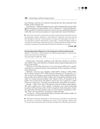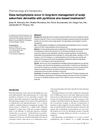 53 citations,
June 2017 in “Skin appendage disorders”
53 citations,
June 2017 in “Skin appendage disorders” PRP treatment helps hair growth in most cases, but more research needed.
 41 citations,
June 2018 in “Journal of The American Academy of Dermatology”
41 citations,
June 2018 in “Journal of The American Academy of Dermatology” Some treatments for folliculitis decalvans work well, with tetracyclines and a mix of rifampicin and clindamycin being most effective.
 29 citations,
March 1983 in “Journal of The American Academy of Dermatology”
29 citations,
March 1983 in “Journal of The American Academy of Dermatology” New treatments for psoriasis have improved effectiveness and may reduce long-term side effects when combined with standard therapies.
 40 citations,
December 2016 in “Journal of Dermatological Treatment”
40 citations,
December 2016 in “Journal of Dermatological Treatment” JAK inhibitors show promise for treating skin and hair disorders but need more research on long-term safety and effectiveness.
 11 citations,
June 2020 in “Dermatologic Therapy”
11 citations,
June 2020 in “Dermatologic Therapy” Combination therapies work better than single treatments for hair loss.
 98 citations,
May 2008 in “British Journal of Dermatology”
98 citations,
May 2008 in “British Journal of Dermatology” There are many treatments for permanent hair loss disorders, but their effectiveness varies and there's no clear best option.
 7 citations,
February 2022 in “Journal of Personalized Medicine”
7 citations,
February 2022 in “Journal of Personalized Medicine” Platelet-Rich Plasma therapy significantly increases hair density in people with Androgenic Alopecia, and works better with more treatments per month and in younger patients.
 June 2020 in “Journal of Investigative Dermatology”
June 2020 in “Journal of Investigative Dermatology” More research with diverse participants is needed to determine the effectiveness of photobiomodulation devices for hair loss treatment.
 January 2006 in “Yearbook of Dermatology and Dermatologic Surgery”
January 2006 in “Yearbook of Dermatology and Dermatologic Surgery” Most studies on perioral dermatitis treatment are of low quality, with some agreement on oral tetracycline effectiveness and stopping steroids and cosmetics.
 83 citations,
April 1992 in “Clinical Endocrinology”
83 citations,
April 1992 in “Clinical Endocrinology” Having enough iron improves the effectiveness of a specific hair loss treatment in women.
 25 citations,
July 2017 in “Archives of Dermatological Research”
25 citations,
July 2017 in “Archives of Dermatological Research” Herbal products might promote hair growth with fewer side effects, but more research is needed to confirm their safety and effectiveness.
 21 citations,
January 2019 in “Lasers in Medical Science”
21 citations,
January 2019 in “Lasers in Medical Science” Low-level laser therapy significantly increases hair density in adults with hair loss, with low-frequency treatment being more effective.
 3 citations,
August 2011 in “Current Psychiatry Reviews”
3 citations,
August 2011 in “Current Psychiatry Reviews” Family-based treatment is the best outpatient care for stable teens with anorexia, and more research is needed on medication and treatment effectiveness for young people with eating disorders.
 April 2024 in “Skin research and technology”
April 2024 in “Skin research and technology” Botulinum toxin A has limited effectiveness for 3 months in treating female pattern hair loss and may reduce scalp oiliness.
 15 citations,
October 2020 in “Journal of Investigative Dermatology Symposium Proceedings”
15 citations,
October 2020 in “Journal of Investigative Dermatology Symposium Proceedings” Platelet-Rich Plasma (PRP) could potentially help regrow hair in people with Alopecia Areata, but more research is needed to confirm its effectiveness.
 15 citations,
October 2017 in “Dermatologic Clinics”
15 citations,
October 2017 in “Dermatologic Clinics” New treatments for male hair loss show promise but need more research for safety and effectiveness.
 1 citations,
July 2023 in “Cureus”
1 citations,
July 2023 in “Cureus” Cetosomal minoxidil alone and with finasteride is effective and well-tolerated for hair loss treatment.

Minoxidil and finasteride are the only FDA-approved treatments for hair loss caused by genetic and hormonal factors, but their effectiveness is often doubted, indicating a need for new treatments.
December 2021 in “Cureus” Minoxidil alone is the most cost-effective treatment for male hair loss at a $50,000 threshold.
 20 citations,
September 2020 in “Journal of Translational Medicine”
20 citations,
September 2020 in “Journal of Translational Medicine” Mesenchymal stromal cells may help treat severe COVID-19, but more research is needed to confirm their effectiveness.
 4 citations,
January 2016 in “PubMed”
4 citations,
January 2016 in “PubMed” The best way to treat androgenetic alopecia, a common type of hair loss, is through early intervention and a comprehensive approach, but some supplements may reduce the effectiveness of medical treatments.

The authors suggest that 5-α-reductase inhibitors, like dutasteride, are effective in treating frontal fibrosing alopecia and should be the first-line treatment, with other options for severe cases. They also recommend further research on Janus kinase inhibitors.
 April 2024 in “Frontiers in pharmacology”
April 2024 in “Frontiers in pharmacology” Brepocitinib 30mg is most effective for moderate-to-severe alopecia areata, but ritlecitinib 50mg may offer a better balance of safety and effectiveness.
 5 citations,
May 2020 in “Diagnostics”
5 citations,
May 2020 in “Diagnostics” Lower zinc levels may predict less effective hair loss treatment.
 April 2018 in “Journal of Investigative Dermatology”
April 2018 in “Journal of Investigative Dermatology” Platelet Rich Plasma can potentially help in restoring hair loss, but more research with larger groups is needed to confirm its effectiveness and standardize its use.
 16 citations,
December 2008 in “International Journal of Dermatology”
16 citations,
December 2008 in “International Journal of Dermatology” Long-term use of pyrithione zinc shampoos remains effective for scalp seborrheic dermatitis, with decreased effectiveness likely due to not following treatment instructions rather than the treatment itself.
 4 citations,
February 2019 in “Biological Trace Element Research”
4 citations,
February 2019 in “Biological Trace Element Research” Chromium salts may help with insulin sensitivity in PCOS, but more research is needed to confirm their overall effectiveness and safety.
 December 2024 in “Pharmaceutics”
December 2024 in “Pharmaceutics” Spironolactone nano-formulations show promise for treating skin disorders, but more research is needed for safety and effectiveness.
 108 citations,
March 2006 in “Archives of Dermatology”
108 citations,
March 2006 in “Archives of Dermatology” Finasteride with oral contraceptive helps improve hair loss in premenopausal women.
 43 citations,
November 1992 in “International Journal of Dermatology”
43 citations,
November 1992 in “International Journal of Dermatology” Minoxidil 2% effectively treats female hair loss, promoting growth and density.





























